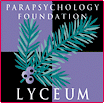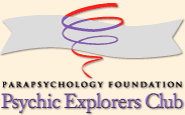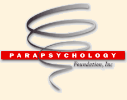 |
 |
| THE BIOGRAPHICAL DICTIONARY OF PARAPSYCHOLOGY WILLIAM JAMES Philosopher, psychologist. B. January 11, 1842, New York, N.Y.; d. August 26, 1910, Chocorua, New Hampshire. M.D., 1870, Harvard University; hon. Ph.D., Litt. D., 1893, Padua; hon. LL.D., 1895, Princeton; 1902, Edinburgh; 1905, Harvard. M. 1878, Alice Howe Gibbens: 1 d., 3 s. William James's contributions both to parapsychology and philosophy made him one of the most influential thinkers of his time and today continue to help shape study in both fields. He taught at Harvard for thirty-five years, beginning in 1872 as an instructor in anatomy, physiology and hygiene, and retiring as professor of philosophy in 1907. James inaugurated a course at Harvard on the relationship between physiology and psychology and in 1876 founded the first laboratory for experiemental psychology in the United States and one of the first in the world. In 1889 he became professor of psychology. His Principles of Psychology (1890) quickly became a standard text and is considered a basic work in the modern science of psychology. He became professor of philosophy at Harvard in 1897 and as such lectured at universities in both the United States and Great Britain. His philosophical writings, in which he developed the doctrine of pragmatism, include The Varities of Religious Experience (1902); Some Problems of Philsophy (based on a series of lectures in 1906 and posthumously published); Pragmatism (1907); The Meaning of Truth (1909); and A Pluralistic Universe (1909). Professor James's pioneering study of psychology led him n th 1880s to an allied interest in psychic research that was to concern him for the rest of his life. He followed attentively the work of the Society for Psychical Research, London, believing the movement served to make clearer the part played by the subsconcious in the human mind. In 1884 he helped found the American Society for Psychical Research, later cooperating in investigations of supposed hauntings, apparitions and mediumship with its secretary, Richard Hodgson (q.v.). James served as president of th British society in 1894-95, remaining its vice-president and contributing to its proceedings and those of the American society until his death. Perhaps his most celebrated investigation was that of the American medium Mrs. Leonore Piper (q.v.), who he first visited, with some skepticism, in 1885. In his first of many reports on Mrs. Piper in the ASPR Proceedings (Vol. 1, 1886), he declared: "I am persuaded of the medium's honesty and of the genuineness of her trance, and although at first disposed to think that the 'hits' she made were either lucky coincidences or the result of knowledge on her part of who the sitter was and of his or her family affairs, I now believe her to be in possession of a power as yet unexplained." James's experiments with Mrs. Piper, which continuted until shortly before his death, and his other investigations convinced him the "veridical phantasms, haunted houses, trances with supernormal faculty...are natural phenomena which ought, just like other natural events, to be followed up with scientific curiosity." Although many other scholars of stature equal to James's have been harshly criticized for their extracurricular interest in "psychics," James somewhow escaped such criticism. Perhaps because the unassailability of his reputation as a pragmati philosopher combined happily with his serene but firm conviction regarding the validity of psychic research, he succeeded instead in converting many skeptical colleagues at least to the point of admitting that investigation was justified. Dicussing mediumship in the essay "Final Impressions of a Psychical Researcher (Memories and Studies, 1911), he said: I go on record for the presence, in the midst of humbug, of really supernormal knowledge that cannot be traced to the ordinary sources of information--the senses, namely, o fthe automatist." He admitted that he might be "dooming myself to the pit in the eyes of better-judging posterity; I may be raising myself to honor; I am willing to take the risk for [this] is my truth as I now see it." James theorized in the smae essays that a "mediums's will to personate" played a part in producing phenomena, and that there is "an interaction between the slumbering faculties in th automatist's mind and a cosmic environment of other consciousness...able to work upon them." When, shortly after Hodgson's death in 1905, a long series of communications purporting to come from him were received through Mrs. Piper, James edited and reported on them in the SPR Proceedings (Vol. 23, 1909). "I find myself doubting that Mrs. Piper's dream life, even equipped with 'telepathic powers,' accounts for all the resultsl found," he said in the report. "But if asked whether the will to communicate be Hodgson's or some mere spirit-counterfeit or Hodgson, I remain uncertain and await more facts, facts which may not point clearly to a conclusion for fifty or one hundred years." See William James and Psychical Research (1960) by Gardner Murphy (q.v.) and Robert Ballou. Taken from Helene Pleasants (1964) Biographical Dictionary of Parapsychology with Directory and Glossary 1946-1996 NY: Garrett Publications |
 |

|
 www. parapsychology. org |
||